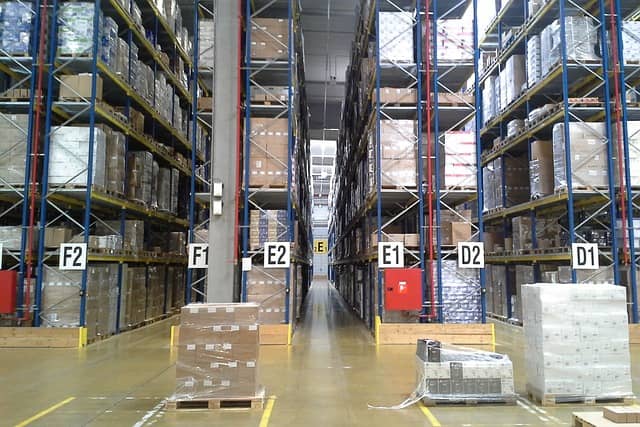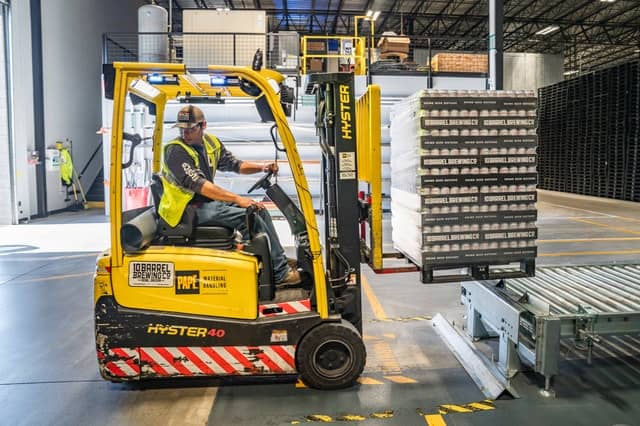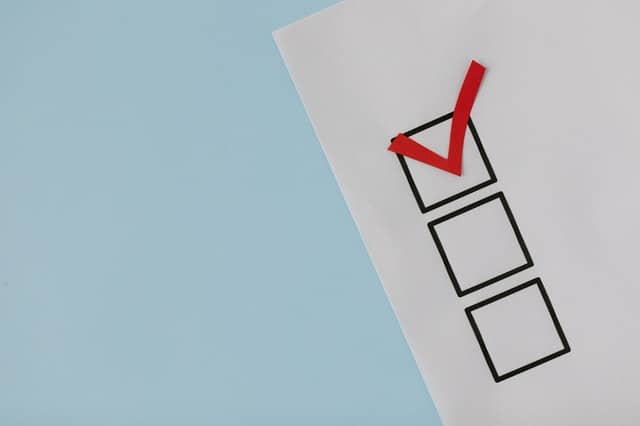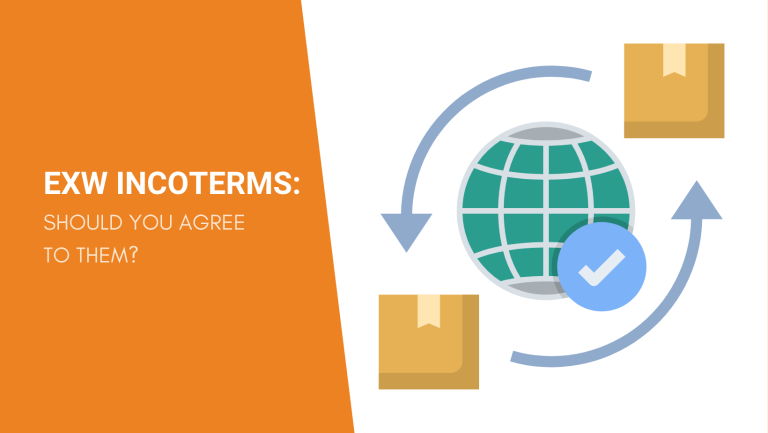As you source and ship goods from abroad, you will likely encounter sellers that offer different kinds of shipping terms. The workings and distribution of risks and costs in such terms are usually based on 1 of the 11 universal Incoterms.
In this blog, we specifically turn the spotlight on EXW Incoterms. We highlight their specifications, advantages, shortcomings, and also compare them to other Incoterms.
Come along, will you?

EXW Meaning
EXW is a logistics abbreviation that stands for ‘Ex Works’.
In this shipping Incoterms, the seller is only responsible for manufacturing and packing the goods for the buyer. The seller’s risk ends once these tasks have been completed and the buyer has been notified and given access to collect their goods.
The expression ‘Ex Works’, therefore, simply denotes the fact that in this shipping term, the seller’s responsibilities end ‘after works’ I.e the preparation of the goods.
How Do EXW Incoterms Work?
In EXW Incoterms sellers and buyers share risk and responsibility as follows:
The Seller’s Responsibilities
A seller under EXW Incoterms rules is tasked with:
- Preparing the goods in accordance with the buyer’s order.
- Packing the goods in packaging that is safe for transit.
- Making the goods available and accessible for the buyer at their premises or distribution depot.
- Informing the buyer that their goods are ready and due for collection within a specified period.
The risk of the goods transfers from the seller to the buyer once the goods are ready and due for collection.
The Buyer’s Responsibility
The buyer bears most of the risks, costs, and responsibilities in EXW Incoterms. They are tasked with:

- Collecting the goods from the seller’s premises within the agreed timelines.
- Loading the goods onto their transport.
Note: If the buyer requests the seller to load the goods for them, the buyer is responsible for any damage that occurs to the goods.
- Arranging for export carriage to their preferred destination.
- Paying for loading charges, export clearances, and any other terminal handling charges.
- Arranging and paying for the insurance of the goods in transit.
- Paying for unloading charges, import duties, and any other terminal handling fees that may arise at their port of import.
- Arranging and paying for last-mile delivery to their premises.
The rules of EXW Incoterms allow the buyer to ask for the seller’s assistance if they need any documentation or the seller’s approval to clear the goods for export. The buyer, however, has to bear all the costs for such processes.
When to Use EXW Incoterms
EXW Incoterms can be used for all modes of transport. You can, therefore, use it without restriction in that regard. Additionally, these shipping terms would be ideal for instances where you:
Dropship

EXW Incoterms would be convenient if you are sourcing goods in bulk and dropshipping them with the help of a dropshipping agent. Such terms would allow your agent to:
- Inspect the goods at the seller’s premises.
- Collect them if the goods are in order.
- Keep the goods in their warehouse then pack and dispatch them to fulfill dropshipping orders as they come in.
Prefer to Have Control Over the Shipping
Some sellers may use carriers that you do not approve of due to poor service or overly expensive charges. In such a situation, it would be wise to opt for EXW Incoterms because they enable you to fully take charge of all stages of shipping.
Require Post-Manufacturing Services

Services such as product branding can only be provided once the manufacturer has fully prepared the goods.
Under EXW Incoterms, you or your sourcing agent can easily collect the goods and proceed to make the necessary arrangements for them to be branded or repackaged.
Comparing EXW Against Other Incoterms
EXW is structured rather uniquely compared to all other shipping terms. It is, in fact, the only Incoterm where the seller’s responsibility ends at their premises. You could, nevertheless, weigh it against other options as below.

EXW vs FAS
Free Alongside Ship (FAS) Incoterms mandate the seller to transport the goods from their premises to the shipping terminal. The seller should then clear the goods for export and hand them over to the buyer’s export carrier.
FAS solves one of the biggest challenges experienced under EXW rules. It saves buyers the headache of handling export clearances which they may not be familiar with and thus still end up requiring the seller’s help.
The only downside, perhaps, is that FAS can only be used for sea or ocean freight, unlike EXW that works for all modes of transport.
EXW vs FCA
Free Carrier (FCA) Incoterms are shipping terms where the seller is responsible for loading and transporting goods to a destination agreed upon with the seller. The destination can be a shipping terminal, an airport, or even a train freight station.
The seller is further tasked with clearing the goods for export and handing them over to the buyer’s chosen carrier. The risk of the goods transfers to the buyer once the seller hands over the goods to the carrier.
Notably, FCA also solves the problem of export clearances and keeps the seller’s responsibilities to a minimum. However, it equally provides an added advantage because it can be used for any mode of transport.
Advantages and Disadvantages of EXW Incoterms
EXW Incoterms present the following benefits and challenges for sellers and buyers.

Advantages
For the seller:
- Sellers bear minimum risk, costs, and responsibilities under EXW rules.
- Sellers are not obliged to invest in any delivery or logistical systems to fulfill buyers’ needs.
For the buyer:
- Arranging the transportation of your goods independently could help you save on costs.
- It is easier to coordinate order fulfillment and post-manufacturing services under EXW Incoterms.
Disadvantages
For the seller:
- Some buyers may prefer sellers that offer more convenient shipping terms.
For the buyer:
- EXW Incoterms place all risks, costs, and shipping responsibilities on the buyer which can be overburdening compared to other Incoterms.
- It can be difficult to navigate export procedures in a foreign country.
- If a buyer is not savvy about how to negotiate with carriers and coordinate other logistics in the export country, EXW shipping could end up being very expensive.
FAQs on EXW Incoterms
What Does Ex Warehouse Mean?
Ex Works Incoterms can be expressed in reference to a location. In this case, ‘Ex Warehouse’ indicates that the buyer should collect the goods at the seller’s warehouse.
Which Is Better FOB or EXW?
Free on Board (FOB) Incoterms require the seller to transport the goods to the buyer’s carrier, clear them for export, and load the goods for transport. The seller should also pay for all these costs up to this point.
Undoubtedly, FOB offers way more benefits to the buyer than EXW. It also still gives you the freedom to organize your own carrier. Subsequently, it may be a better option if you prefer the seller to handle the pre-shipping responsibilities.
What Are the Negotiable Aspects of EXW Incoterms?
As you discuss EXW shipping with your supplier, you can negotiate some details in your favor. They include:
- Collection logistics– try and negotiate collection timelines that are convenient for you. Some sellers even offer warehousing services where you can collect the goods close to the date when your carrier is to ship them. This could minimize your risk.
- Export clearances– make an effort to familiarize yourself with the export clearance processes in your export country. Use your finding to reach an understanding with your seller on how (if necessary) they can make the clearances easier for you.
- Product inspections- ordinarily, it is a seller’s responsibility to handle product inspections if they are required for export. However, given the limitations of EXW, it is best to discuss and agree on which one of you will facilitate this.
In Conclusion
EXW Incoterms can be convenient in some cases but they often require effort and lots of coordination to pull off. It is thus advisable to work with a dropshipping or sourcing agent if you are unfamiliar with how to deal with carriers or customs officials in your export country.
At NicheSources, our services provide solutions to all the challenges you may experience under EXW Incoterm rules. We can collect your goods and provide order fulfillment, branding services, or arrange safe, affordable, and efficient shipping to your country.
Simply send us a request outlining your sourcing, dropshipping, or shipping requirements and request a free quote. We will get back to you with all the details you need to get started.

